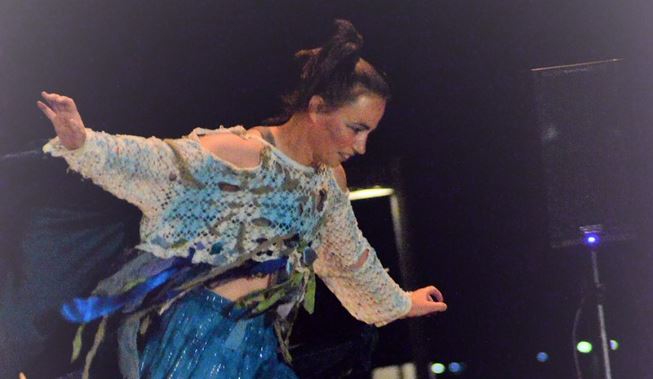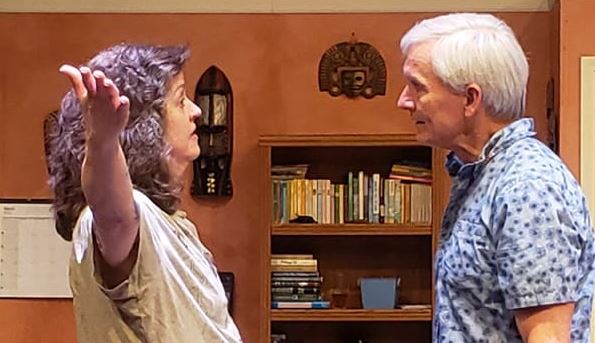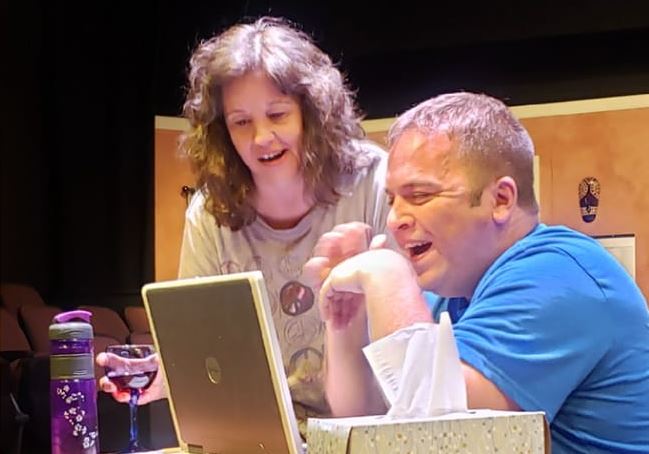In many ways the Martins, the quintet of characters who populate Deanna Jent‘s hour-long, 2011 play Falling, resemble a typical American family. Mother Tami, in some ways a stand-in for Jent herself, is overwhelmed and fond of red wine. Husband Bill pitches in where he can but pines for sex with his wife. Teenage son Josh demands a day off from school. Little sister Lisa wishes Josh didn’t monopolize their parents’ attention. Bill’s mother “Grammy Sue” offers emotional support via banal Bible quotations. There’s one all-important factor missing from that synopsis, however: Josh is a person with autism, given to veering from giddy hilarity to violent frenzy with little provocation or warning. Presenting those characters and their struggles realistically and empathetically were the challenges facing first-time director Silva Goetz in a production of Falling now running at Olympia Little Theatre (OFT).

“I am a mental health professional,” explains Goetz. “I’ve been working in community mental health for 10 and a half years. I have about 11 years as a therapist in this community.” That and her résumé as an actor (Other Desert Cities at OLT, The Tempest at Port Plaza) made her the logical choice to step in when a different director had to bow out a few years ago. Delayed by the pandemic, Goetz’s production opens this weekend. It stars Jeremy Holien as Josh, Sarah Johnson as Lisa, Sharry O’Hare as Grammy Sue, Debbie Sampson as Tami and Tom Sanders as Bill. The set, a realistic, present-day, suburban living room, was designed by Goetz’s partner, Robert McConkey.
As Jent told Playbill in 2012, “As humans, we’re all different, and everyone with autism is different.” This play was drawn from Jent’s journals about parenting a teenager with autism. Her experiences informed her belief that this play’s about parents losing and gaining dreams they have for their children. If its story lacks a clear resolution, that’s reflective of the enduring struggles parents face as they address the needs of family members with autism. The show is performed in mostly naturalistic style, with a few expressionist moments that bare an exhausted Tami’s inner life. Sampson, a mother herself and fifth-grade teacher, is open and believable in the role.
“Playing Tami is absolutely the most difficult role I’ve ever had,” says Sampson, “but also the most fulfilling. It has offered me a rare glimpse into the lives of families I’ve only ever seen from a teacher’s perspective. I believe that has made me a better educator and a better human. I feel privileged to bring these families’ challenges to the stage. I hope the audience takes away more patience, understanding and grace from their time spent with the Martin family.”

Josh has “been diagnosed with autism spectrum disorder, or ASD,” Goetz explains, “and it is a neurocognitive, developmental disorder. That just means your brain develops differently than a lot of other people. And because it’s a spectrum disorder, autism can range from savant, Asperger’s, higher-functioning to nonverbal, not being able to take care of yourself.” She provided Holien, whose embodiment of Josh lies between those extremes, with a variety of resources, from the Netflix series Love on the Spectrum to the work of Temple Grandin, an animal behaviorist and pioneering spokesperson for people with autism. “She’s definitely a higher-functioning person with autism,” says Goetz, “and she does book tours and audiobooks and talks about her experience growing up with autism.” Josh attends school and has a Marvel collection and likes surfing YouTube as do many of his classmates, but he’s also oblivious to social proprieties and is easily aggravated by minor household disruptions. The arrival of Grammy Sue, unfortunately, is one such triggering event; Falling tracks the Martins through that tumultuous day.
It’s indicative of the show’s raw intensity that Sanders, already cast as Bill, was tasked with providing his fellow actors with all-too-realistic fight choreography. Goetz’s program notes say “Jent encourages productions to lean into the hard,” and Falling is sometimes difficult to watch. That’s part of what makes it so compellingly relatable. We’re invited to look deeply into the lives of people we tend to overlook while priding ourselves for “politely” ignoring them.
In his essays about theater, German playwright Bertolt Brecht often wrote about what he called Verfremdungseffekt, usually translated as a “distancing” or “estrangement effect.” It’s a category of techniques by which audience members are jolted out of a narrative so they can analyze it critically without emotions taking charge of their faculties. Falling presents at least two of those moments, both undeniably jarring. The first occurs early in the show, when Tami loses herself in a familiar rock song. Another arrives late and will not be revealed here, other than to say it gives Holien a chance to suggest what life may have offered a version of Josh who grew up without autism. That alternate Josh would’ve been easier to raise and, Jent suggests, easier for his family to love. The Martins’ goal isn’t to “cure” Josh, despite Grammy Sue’s belief in the healing power of prayer. Rather, it’s to find a way of supporting, protecting and nurturing a young man who, against his own best wishes, presents a physical threat to his family.

“The main point, the main takeaway for this show,” Goetz concludes, “is this is not a show about autism. This is a show that asks a much different, much deeper, much more important question, and that is, ‘How do you love someone who’s difficult to love?’ ” She knows the answer in her own heart, she reveals, but invites us to search for our own.
Photo credits: Ned Hayes, Olympia Little Theatre.
WHAT
Falling
WHEN
7:25 p.m. Fridays and Saturdays,
1:55 p.m. Sundays, June 10-26
WHERE
Olympia Little Theatre,
1925 Miller Ave. NE, Olympia
HOW MUCH
$9-$15
LEARN MORE
360-786-9484
olympialittletheater.org
